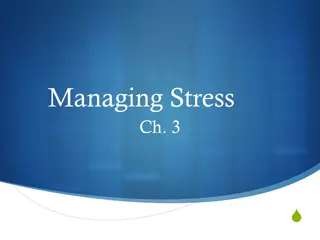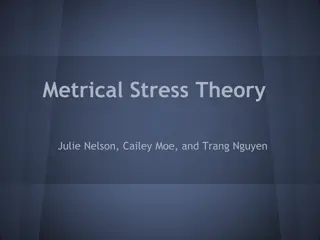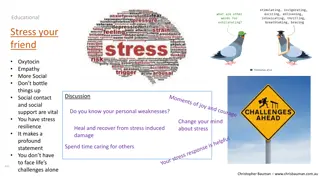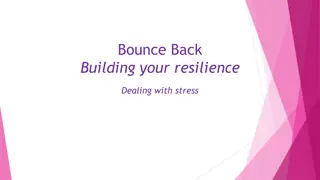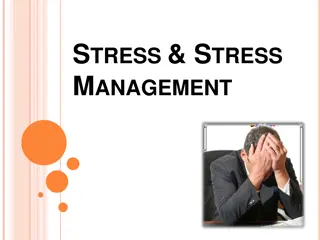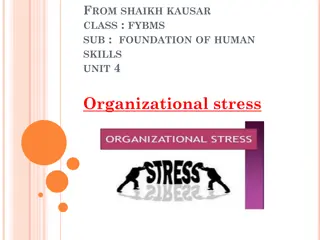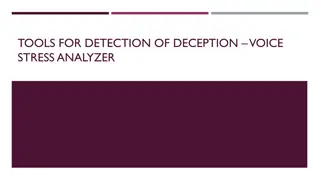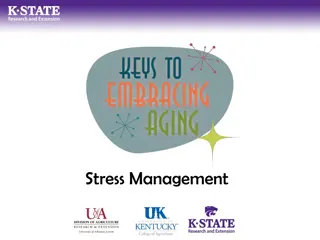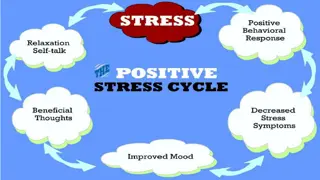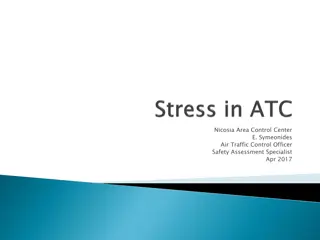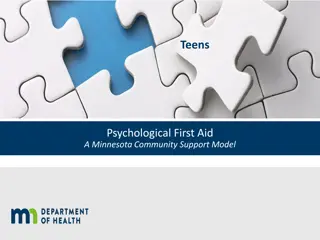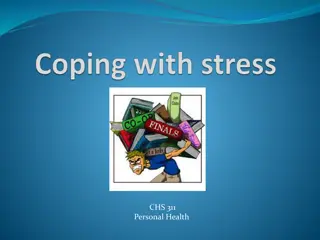Building Resilience: From Stress to Strength
Psychological resilience allows individuals to bounce back from stress, adversity, and change effectively. This book by Gaynor Parkin delves into what promotes resilience, highlighting the importance of everyday habits and exercises in building resilience. The evidence presented covers the role of physical fitness, stress hormones, mindfulness, positive emotions, cognitive flexibility, problem-solving skills, and connectedness. The current study explores whether resilience training can make a difference for organizations under pressure.
Download Presentation

Please find below an Image/Link to download the presentation.
The content on the website is provided AS IS for your information and personal use only. It may not be sold, licensed, or shared on other websites without obtaining consent from the author.If you encounter any issues during the download, it is possible that the publisher has removed the file from their server.
You are allowed to download the files provided on this website for personal or commercial use, subject to the condition that they are used lawfully. All files are the property of their respective owners.
The content on the website is provided AS IS for your information and personal use only. It may not be sold, licensed, or shared on other websites without obtaining consent from the author.
E N D
Presentation Transcript
From stress to strength: building resilience under pressure Gaynor Parkin Psychology @ Victoria
Overview What promotes psychological resilience? Current study Observations
Psychological resilience Ability to adapt and recover well after stress, adversity or change Bouncing back
You cant stop the waves but you can learn to surf Jon Kabat-Zinn
Resilience is built through the everyday, every minute habits and exercises that punctuate our daily lives. Lynda Gratton, Professor, London Business School
Previous research Child development Trauma post traumatic growth Neuroscience Positive Psychology
Evidence to date Physical fitness and recovery role of stress hormones Meditation/Mindfulness Emotion regulation skills Experiencing positive emotions
Evidence to date Cognitive flexibility Realistic optimism Problem solving skills Connectedness
Evidence to date Cognitive flexibility Realistic optimism Problem solving skills Connectedness
Current study (Thanks MSI R&D $)! 6 participating organisations: all under pressure Does resilience training make a difference?
Current study Face to face vs. etraining Block vs. spaced Impact of follow up
Study measures Perceived Stress Scale Brief Mindfulness Measure Work and Well-Being Survey (UWES) Connor-Davidson Resilience Scale Life Orientation Test Revised Adult Coping Scale Health measures
Measures of performance Tricky! Each organisation uses different measures or not Suggestions welcome More focus on this in phase 2
Training modules 1-4 Stress mind-emotion-body responses Resilience from psychological research Physical wellbeing Flexible thinking
Training modules 5-8 Realistic optimism Strong relationships Emotion regulation and positive emotion Recovery and mindfulness tools
Progress to date 289 participants completed training (face to face) 269 completed pre and post measures Poor response rate at follow up More focus on this in phase 2
Participant feedback Request for more follow up Helpful to understand science behind tools Want leadership support
Participant feedback Has the training helped improve your resilience? Health? Performance at work? Coping with stress at work/home Relationships with others
Barriers Changing org. priorities High staff turnover Perceptions of resilience training
Solutions? SLT engagement and participation Invite to participate in training and who attends first important Feedback and changing attitudes
Solutions? Follow up at all levels critical Make resilience habits routine Address disconnect between performance/productivity and well-being initiatives
Questions? Your comments and suggestions are very welcome!




